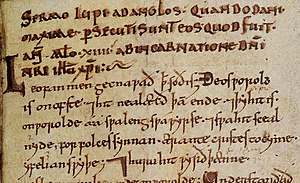Sermo Lupi ad Anglos
The Sermo Lupi ad Anglos ('The Sermon of the Wolf to the English') is the title given to a homily composed in England between 1010 and 1016 by Wulfstan II, Archbishop of York (died 1023), who commonly styled himself Lupus, or 'wolf' after the first element in his name [wulf-stan = 'wolf-stone'].
In addition to tending the spiritual and financial needs of the religious and secular communities of the North of England, he was deeply involved in the vital politics of the South.
He was one of the most important members of king Æthelred II's advisory council, known as the Witan, and as such was active in all the most significant political decisions of the day.
In response, Æthelred retreated to Normandy where he remained until Swein's death the following year, upon which he immediately negotiated his safe return to England and his reinstatement as king.
Dorothy Whitelock writes that "we have no evidence where Wulfstan was at the time of the submission [of England to Swein], but he was at York within a fortnight of [Swegn's] death, and we may suspect that he used his influence to win back the province to the English king Æthelred.
The text of the Sermo Lupi has survived in five manuscripts, a number of which associate the homily with Wulfstan's nom de plume, Lupus.
The rubric, or title, for the Sermo Lupi in this manuscript reads: Sermo Lupi ad Anglos quando Dani maxime persecuti sunt eos, quod fuit anno millesimo XIIII ab incarnatione Domini nostri Iesu Cristi, 'The sermon of the Wolf to the English at the time when the Danes [Vikings] harried them, which was in the 1014th year from the birth of Jesus Christ.'
[12] There is good reason to associate these events with a special oral delivery of the Sermo Lupi by Wulfstan to the re-constituted English Witan.
In order to emphasize the severity of their situation, Wulfstan employed a variety of rhetorical techniques to elicit a sense of urgency (phrase repetition, metaphorical language, etc.).
Rather than suggesting a unified stance against the Vikings, he implored his congregation/English population to abandon the behaviors of plundering, selling one another into slavery, betraying one's lord, buying women for sexual gratification, breaking religious and moral pledges, praising false gods, and a variety of other deplorable acts.
Wulfstan attained a high degree of competence in rhetorical prose, working with a distinctive rhythmical system based around alliterative pairings.
Other intensifying phrases frequently used by Wulfstan, in the Sermo Lupi and in other of his works, are ealles to swyðe "altogether too much", georne "eagerly", mide rihte "in right manner", for Gode and for worulde "for God and for world", among others.
One of the most famous examples is found in the Sermo Lupi: A similar device is at work in his list of afflictions in the first passage given above (here & hunger, bryne & blodgyte ... stalu & cwalu, stric & steorfa, orfcwealm & uncoþu, hol & hete...).
Inadvertently, such types of evocative speeches/texts presented the English as their own worst enemy, ultimately culminating in a passive response toward Viking conquests as they were not the source of their plagues.
[citation needed] The sermon has been regarded as "an invaluable witness to the dismal state of affairs in Æthelred's reign", as it is one of the only contemporary documents which describes the effects of the Viking invasions in the beginning of the eleventh century.
